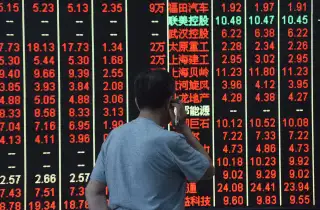Emerging Markets Are Down Big in 2018. Here's Why -- And What You Should Do About It

Despite all the recent cheering about the U.S. bull market, for many investors 2018 has been a decidedly mixed bag.
The U.S. economy keeps humming, with the S&P 500 up over 9% for the year. But far from a strong U.S. economy providing a tailwind for the rest of the world, emerging markets are struggling badly -- and not just because of President Trump's headline-grabbing trade war.
In fact, from late January to early September, the MSCI Emerging Market Index fell 20%, according to an analysis by Bespoke Investment Group. That's the level that indicates a market correction.
What's more that stretch through nearly three quarters of the year is the MSCI Emerging Market’s third-longest bear market on record, according to Bespoke’s analysis.
Chances are your investment portfolio is heavily weighted toward U.S. stocks. But most investors, including those in set-it-and-forget-it vehicles like robo-advisers and target-date funds usually have anywhere from 10% to 20% of their stock holdings invested in emerging-markets stocks.
That means even as the U.S. stock market hits new records, your retirement savings aren't sharing in all the joy.
Yes, tariffs are problem
If there's one thing you've heard about what's ailing emerging markets, it's probably President Trump's trade war with China.
Earlier this month, another round of tariffs went into place, adding a 10% levy against $200 billion worth of goods imported from China. The rate will rise to 25% on January 1. In the announcement, Trump threatened to add another tariff against $267 billion worth of goods if China retaliated.
As result, analysts have been trimming their profit forecasts for many Chinese firms. For instance, UBS recently cut its forecast for the largest Chinese stocks traded on the Shanghai and Shenzhen stock exchanges by nearly half, according to Business Insider.
Meanwhile Chinese stocks are down about 13% so far this year, according to Morningstar.
There other, maybe bigger ones
Tariffs on China aren’t the only reason – or even the main reason – emerging markets are lagging, however.
Many other nations' stock markets are suffering as badly, or worse. India is down 10%, South Africa 25%. Argentina has dropped 23% and Brazil 17%.
Their problems have to do with the combination of a strong U.S. dollar and rising interest rates.
When interest rates were at rock bottom only a couple of years ago, both governments and private institutions in many countries, including Argentina, Indonesia and Turkey, borrowed heavily in U.S. dollars. Now, however, they face a double-whammy. U.S. interest rates are rising. And so is the dollar relative to these nations' home currencies. That means debtors in those nations not only have to make higher regular interest payments, they also need to regularly convert larger amounts of their local currencies to pay back what the owe in U.S. dollars.
This dynamic first reared its head in Turkey, when inflation gripped the country. The lira’s value has fallen 48% compared to the U.S. dollar this year.
The U.S. isn’t immune
Since tariffs are essentially a tax on U.S. consumers, there is a good chance they will eventually reverberate and hit the U.S. economy too.
The research firm FactSet stress tested the impact on U.S. stocks. It found that, if tariffs stay the same as they stand today, the S&P 500 would eventually fall by 10%. In a more radical scenario, where trade tensions heighten further, the S&P would drop 20%. That hasn’t happened yet, but it’s well within the range of possibilities, if the tariff battle continues to unfold.
Despite the divergence of emerging markets, it remains prudent to continue to hold your international exposure. It’s why you diversify. When one market performs poorly, there’s inevitably another doing well.
After all in 2008, at the height of the global financial crisis, emerging-market stocks were the worst performing class of stocks, only to rebound as the best one in 2009 as global economies began to escape from the financial crisis, according to Schwab.